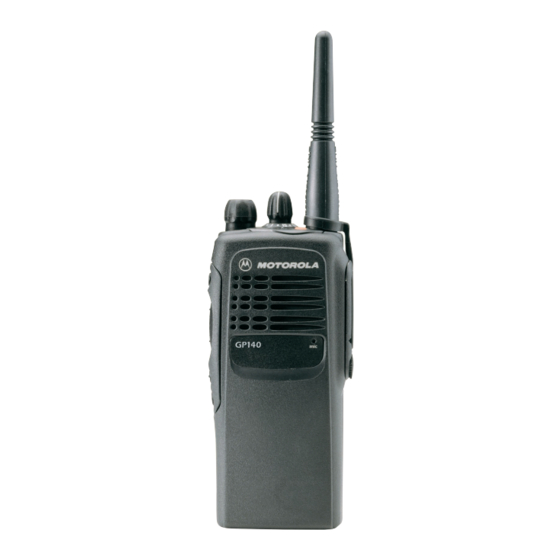Motorola GP140 Series Informasi Layanan - Halaman 15
Jelajahi secara online atau unduh pdf Informasi Layanan untuk Radio Motorola GP140 Series. Motorola GP140 Series 30 halaman. Professional radio, power distribution and controller
Juga untuk Motorola GP140 Series: Panduan Pengguna (20 halaman), Informasi Layanan (32 halaman), Panduan Servis Dasar (46 halaman), Informasi Layanan (30 halaman)

VHF Receiver
3.3
Automatic Gain Control (AGC)
(Refer to the Receiver Front End and Receiver Back End schematic diagrams)
The front end automatic gain control circuit provides automatic reduction of gain of the front end RF
amplifier via feedback. This prevents overloading of backend circuits and is achieved by drawing
some of the output power from the RF amplifier output. At high radio frequencies, capacitor C3327
provides the low impedance path to ground for this purpose. CR3302 is a pin diode used for
switching the path on or off. A certain amount of forward biasing current is needed to turn the pin
diode on. Transistor Q3301 provides this current.
Radio signal strength indicator, RSSI, a voltage signal, is used to drive Q3301 to saturation i.e.
turned on. RSSI is produced by U3220 and is proportional to the gain of the RF amplifier and the
input power to the radio.
Resistors R3304 and R3305 are voltage dividers designed to turn on Q3301 at certain RSSI levels.
To turn on Q3301 the voltage across R3305 must be greater or equal to the voltage across R3324 +
Vbe. Capacitor C3209 is used to dampen any instability while the AGC is turning on. The current
flowing into the collector of Q3301, a high current gain NPN transistor, is drawn through the pin
diode to turn it on. Maximum current flowing through the pin is limited by resistors R3316, R3313,
R3306 and R3324. Feedback capacitor C3326 used to provide some stability to this high gain stage.
An additional gain control circuit is formed by Q3201 and associated components. Resistors R3206
and R3207 are voltage dividers designed to turn on Q3201 at a significantly higher RSSI level than
the level required to turn on pin diode control transistor Q3301. In order to turn on Q3201 the voltage
across R3207 must be greater or equal to the voltage across R3208 + Vbe. As current starts flowing
into the collector of Q3201, it reduces the bias voltage at the base of IF amplifier transistor Q3200
and in turn, the gain of the IF amplifier. The gain is then controlled in a range of -30dB up to +10dB.
2-5
